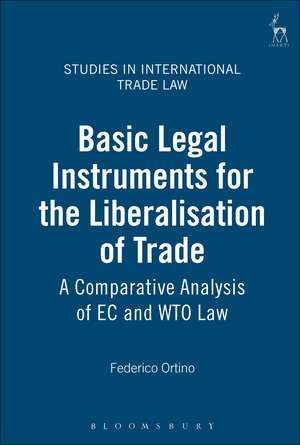Basic Legal Instruments for the Liberalisation of Trade: A Comparative Analysis of EC and WTO Law: Studies in International Trade and Investment Law
Autor Federico Ortinoen Limba Engleză Hardback – 29 ian 2004
Din seria Studies in International Trade and Investment Law
- 13%
 Preț: 195.38 lei
Preț: 195.38 lei - 30%
 Preț: 901.55 lei
Preț: 901.55 lei - 27%
 Preț: 444.01 lei
Preț: 444.01 lei - 37%
 Preț: 510.83 lei
Preț: 510.83 lei - 30%
 Preț: 512.69 lei
Preț: 512.69 lei - 19%
 Preț: 303.80 lei
Preț: 303.80 lei - 22%
 Preț: 231.24 lei
Preț: 231.24 lei - 30%
 Preț: 601.63 lei
Preț: 601.63 lei - 30%
 Preț: 781.55 lei
Preț: 781.55 lei - 13%
 Preț: 238.76 lei
Preț: 238.76 lei - 30%
 Preț: 570.11 lei
Preț: 570.11 lei - 30%
 Preț: 1016.59 lei
Preț: 1016.59 lei - 30%
 Preț: 600.15 lei
Preț: 600.15 lei - 30%
 Preț: 778.68 lei
Preț: 778.68 lei - 30%
 Preț: 955.20 lei
Preț: 955.20 lei - 30%
 Preț: 540.80 lei
Preț: 540.80 lei - 30%
 Preț: 543.08 lei
Preț: 543.08 lei - 30%
 Preț: 599.66 lei
Preț: 599.66 lei - 26%
 Preț: 777.71 lei
Preț: 777.71 lei - 22%
 Preț: 269.66 lei
Preț: 269.66 lei - 22%
 Preț: 266.30 lei
Preț: 266.30 lei - 18%
 Preț: 299.86 lei
Preț: 299.86 lei - 18%
 Preț: 307.97 lei
Preț: 307.97 lei - 18%
 Preț: 306.26 lei
Preț: 306.26 lei - 18%
 Preț: 305.53 lei
Preț: 305.53 lei - 27%
 Preț: 447.39 lei
Preț: 447.39 lei - 18%
 Preț: 321.48 lei
Preț: 321.48 lei - 30%
 Preț: 512.54 lei
Preț: 512.54 lei - 30%
 Preț: 573.70 lei
Preț: 573.70 lei - 30%
 Preț: 511.40 lei
Preț: 511.40 lei -
 Preț: 374.55 lei
Preț: 374.55 lei
Preț: 956.09 lei
Preț vechi: 1371.32 lei
-30% Nou
Puncte Express: 1434
Preț estimativ în valută:
182.94€ • 191.52$ • 151.38£
182.94€ • 191.52$ • 151.38£
Carte tipărită la comandă
Livrare economică 05-19 aprilie
Preluare comenzi: 021 569.72.76
Specificații
ISBN-13: 9781841134253
ISBN-10: 1841134252
Pagini: 524
Dimensiuni: 156 x 234 x 41 mm
Greutate: 0.91 kg
Editura: Bloomsbury Publishing
Colecția Hart Publishing
Seria Studies in International Trade and Investment Law
Locul publicării:London, United Kingdom
ISBN-10: 1841134252
Pagini: 524
Dimensiuni: 156 x 234 x 41 mm
Greutate: 0.91 kg
Editura: Bloomsbury Publishing
Colecția Hart Publishing
Seria Studies in International Trade and Investment Law
Locul publicării:London, United Kingdom
Caracteristici
This study provides an in-depth analysis of the core legal concepts characterising the two most prominent and successful efforts in the regulation of international trade to date.
Notă biografică
Federico Ortino is a lecturer in International Trade Law at the University of Trento and a legal consultant to the law firm Mastellone and Associates in Florence, Italy.
Cuprins
Introduction: Defining the Boundaries of the ResearchPART I. SHALLOW INTEGRATION1. Negative Integration Stricto Sensu: The Elimination of Border Measures2. Judicial Integration-First Layer: The National Treatment Principle and the Prohibition of De Jure DiscriminationPART II. DEEP INTEGRATION3. Judicial Integration-Second Layer: The National Treatment Principle and the Prohibition of De Facto Discrimination4. Judicial Integration-Third Layer: The Reasonableness Rule5. Conclusion
Recenzii
...most impressive scholarly work. Its foremost value lies in the systematic manner in which the comparative analysis of EC and WTO law is accomplished.
Descriere
An in-depth analysis of the core legal concepts characterising the two most prominent efforts in the regulation of international trade.
